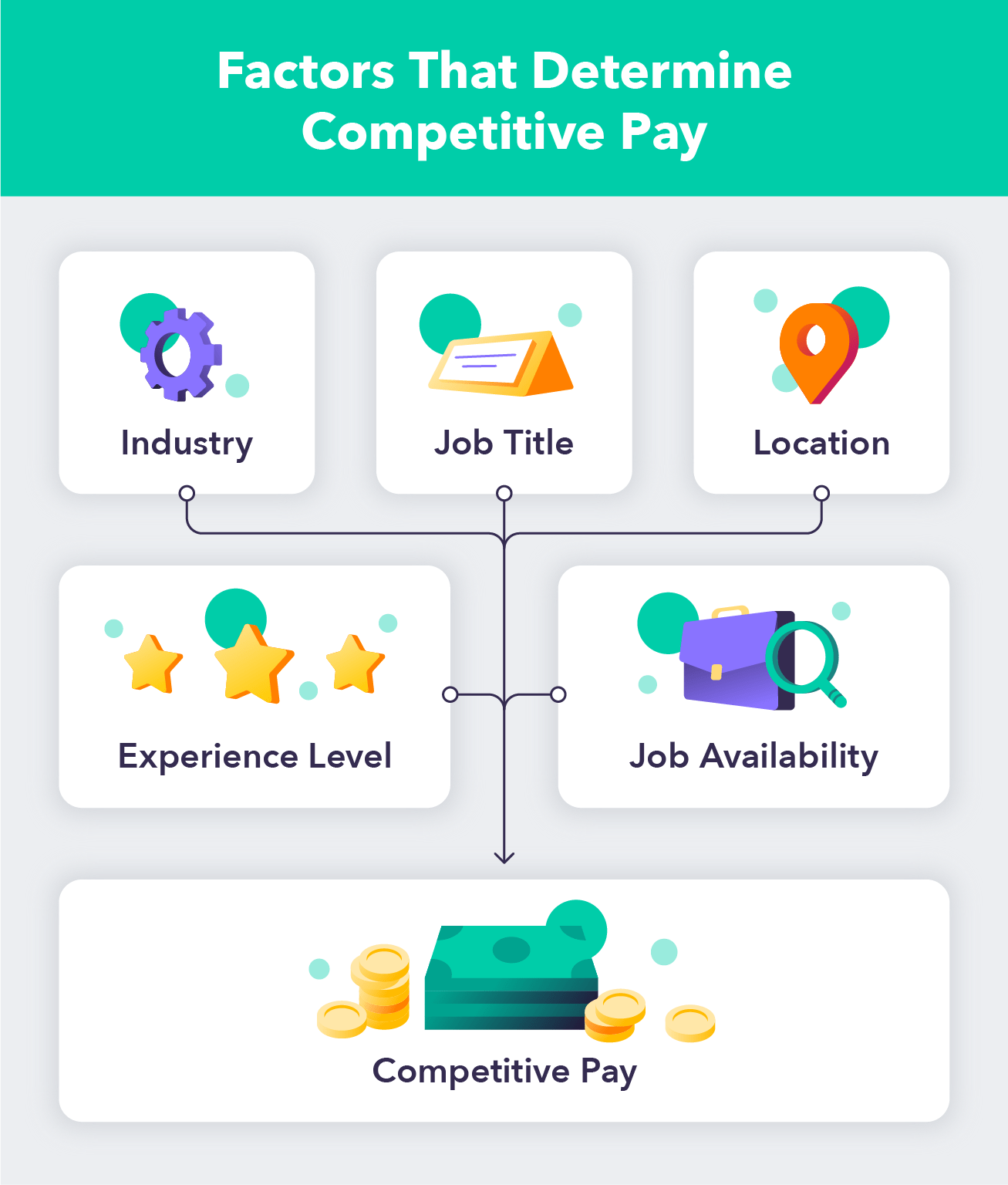Competitive Pay: Anyone who has spent time looking for work may have come across the same hiring buzzwords again and over again. “Competitive pay” is a phrase that is frequently used in job descriptions to attract top personnel. While these two words are appealing to people trying to increase their earning potential, it is not often clear what they actually entail. To help you grasp this phrase and what it means for you, read on for a description of competitive pay, specifics on what’s normally included in a competitive compensation package, and methods to obtaining one.
What Is Competitive Pay?
When it comes to compensation, “competitive” often means offering compensation that is comparable to or better than the market worth of a position. Human resources may pay competitive salaries on the open market with an additional percentage of that amount for the position. It is possible that this percentage will fluctuate depending on the company’s pay philosophy. Compensation is also somewhat competitive compared to what other organisations in the same sector and geographic area might be willing to pay for a similar position.
5 Factors That Determine Competitiveness
Your pay may vary greatly, depending on the conditions around your job, such as industry and location. It is also crucial to bear in mind that the value of your stock holdings will fluctuate greatly, so you should expect changes in compensation. In the table below, see an overview of elements that can affect compensation.
1. Job Title
It is not uncommon for jobs to be paid based on a market rate, and it is important to take that into consideration when setting a competitive wage. You should check compensation data from trustworthy industry resources such as the Bureau of Labor Statistics (BLS) to see if you’re getting a fair deal. The first step is to determine the average market rate, and use this value as a guideline to help you determine pay competitiveness. Also, remember that compensation ranges can vary based on the position, so make sure you’re clearly referring to the job title when completing your research.
2. Experience Level
As a rule, most employers will offer pay that matches either your experience level or the amount of experience essential for the job. Experience level, price range, and employment track all impact the variety of tasks one is capable of doing, and whether or not a role is entry-level, mid-tier, or above. The best example of this concept is entry-level employment, which requires no experience and is compensated little. In contrast, mid-tier roles demand several years of expertise and are paid less. In order to get an accurate picture of what kind of compensation you can expect, you need to take into consideration both your education and your capabilities. Also, it is important to keep in mind the demand for your competitive skillset in order to establish a fair wage.
3. Industry
In addition to creating the norm of competitive pay, the industry you want to work in wields tremendous control on the payment you may expect. For these highly lucrative areas, such as technology and finance, to remain attractive places to work, salaries will likely be more competitive to attract top personnel.
In other words, if you want to have a career path that you have defined, but you are not absolutely set on a specific industry, then you should apply for the same position in other industries to find out whether the compensation packages vary. If you are looking for a high wage, investigate industry averages to find the industry with the highest average compensation. Apply to as many companies in that area as possible to identify the company offering the most competitive wage.
4. Geography
The location of the market also impacts the typical market rates of a position. This is commonly found in areas with a higher cost of living and higher minimum wage standards, and thus must compensate more to account for these additional expenses. It’s generally more accurate to narrow your inquiry to a specific geographic location when obtaining salary and wage information. Wage data is provided by the BLS on the basis of various geographic regions, as well as various states and cities within each region.
5. Job Availability
Like the market price fluctuates depending on the amount of supply and demand, pay fluctuates accordingly. Pay in a high-demand position, where there is a shortage of workers, is most likely to be competitive. Alternatively, a post may be in low demand, but the qualified candidates present to make up for the lack of demand, which means that the market rate of the post decreases. In the event that you’re interested in a hiring pool that works to your advantage, look into this list of jobs in high demand, which tend to increase quickly.
What’s in a Competitive Pay Compensation Package?
Competitive pay does not only relate to the amount of money that is paid; it is the entirety of compensation. Also, see if you can learn about what other perks are provided, such as paid time off, insurance, retirement options, and other bonuses.
Paid Time Off
In a compensation package, one of the most essential factors is the quantity of paid leave that is granted. Staying healthy is vital, and taking time off from work is a key part of this. In addition, time off from work is required if anything happens in your personal life or if you are sick. Taking frequent vacations, whether abroad or locally, is also effective in establishing limits at work to reduce burnout. You are more likely to maintain your performance and to strive for both personal and professional goals when you can successfully balance your life and job.
Health Insurance
In addition to being a requirement for being employed, health insurance is a commonly included compensation package and will vary based on whether you are employed full time or part-time. More favourable employee benefits, such as medical, dental, and vision insurance, are quite common, which means it should come as no surprise that better quality health coverage is frequently a highly valued pay in today’s competitive labour market.
Retirement Options
A large number of businesses also feature retirement plans as part of their compensation. It all depends on your workplace and your available options, but you may be able to contribute part of your income to a 401(k), 403(b), or Roth IRA to start saving for retirement. This strategy is beneficial because your employer will often match a certain proportion of your contributions, which means you should maximise your contributions by donating the maximum allowed each year as long as you can afford it.
Other Benefits
Salary, paid time off, health insurance, and retirement choices comprise the majority of a basic compensation package, but they are not the only alternatives that are open to you. You should feel free to ask about other compensation advantages, such as bonuses, stock options, and profit-sharing when making your decision on a job offer. The following are a few ideas for salary-related conversations to include in your next discussion:
- Signing bonus
- Performance bonus
- Relocation bonus
- Stock options
- Profit-sharing plan
- Supplemental budget (e.g., for wellness or career development)
How To Ask for More Competitive Pay
When a job description specifies that there is an opportunity for competitive pay, this indicates that the organisation or corporation is prepared to negotiate compensation. When applying for a competitive position, you should remember that compensation is determined by a variety of criteria, some of which are unique to you as an applicant. Ascertain the information described above, and use these three simple steps to leverage that knowledge and try to negotiate for the pay you want.
1. Pick Your Competitive Pay Priorities
 If you want to have a better understanding of your compensation priorities, you should get prepared while negotiating your wage. Compensation is the most important negotiating topic in many wage conversations, but in other cases, it may not be possible to offer a higher salary because of budgetary limits or a company pay scale. The information in this table clearly shows that if this is the case, what alternative forms of compensation would be important to you? In order to be more effective in asking for a one-time signing bonus instead of a greater salary, you may be able to more easily argue for stock in the firm being more aligned with your financial goals.
If you want to have a better understanding of your compensation priorities, you should get prepared while negotiating your wage. Compensation is the most important negotiating topic in many wage conversations, but in other cases, it may not be possible to offer a higher salary because of budgetary limits or a company pay scale. The information in this table clearly shows that if this is the case, what alternative forms of compensation would be important to you? In order to be more effective in asking for a one-time signing bonus instead of a greater salary, you may be able to more easily argue for stock in the firm being more aligned with your financial goals.
2. Backup Your Request With Evidence
One thing to ask for is a larger beginning salary or greater benefits, but that’s not enough. To successfully negotiate better pay, you’ll need to be able to offer a solid argument. Convince your audience of your viewpoint by providing facts from credible research on the market rate for your position, region, and industry.
Consider what you are being paid competitively when negotiating your pay. If your compensation is equivalent to or better than the market rate, then utilise this figure as a reference point when speaking with competitive employers. You can craft an argument for why you deserve a higher income or better benefits by discussing how you have the relevant qualifications, abilities, or experience that will improve the workplace.
3. Politely Stand Your Ground
Wage negotiations are handled by HR professionals who are ready and willing to negotiate, and even if they have room to negotiate, they may answer by indicating that the position is budgeted for the amount they offered. When you make a request, you are allowed to gently challenge the person and ask them to look into your request.
Do you not know how to stand your ground in a professional manner? Test yourself: Say the following:
I understand that the position is budgeted for a specific amount, but based on the value that my abilities and expertise may give to the team, I would want the opportunity to explore a higher compensation of [desired amount].
In order to not lose any of their current customers, they should let you know that that is all they can provide, as well as the opportunity to provide better terms later on. Income increases and job mobility are among the opportunities that you should not lose out on. Lastly, maintain your principles in order to benefit your salary and job mobility.
As you’ve learned, finding out about competitive pay is really exciting. So if you come across this term when you’re job searching, make sure you feel as excited as you can. Keep in mind that competition will vary based on the market rates and what you bring to the table, so adapt your compensation expectations to reflect your research.
Even if your study does not reveal your ideal compensation, you should be confident in your talents and utilise these tactics to negotiate the most competitive compensation package feasible. In either case, whether you wind up with a signing bonus, additional vacation days, or that coveted higher income, you and your budget may be delighted with your achievements.
Sources: American Marketing Association | Digital HR Technology |
The post Competitive Pay: What It Means and How To Get It appeared first on MintLife Blog.
The Article Competitive Pay: What It Means and How To Receive It First Appeared ON
: https://gqcentral.co.uk
The post Competitive Pay: What It Means and How To Receive It appeared first on Local SEO Resources.








